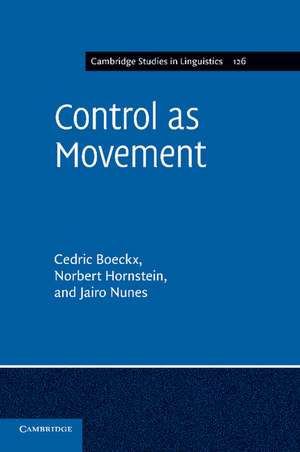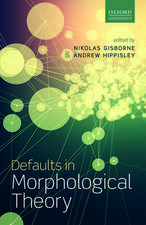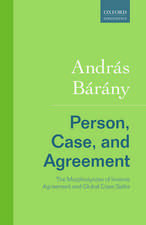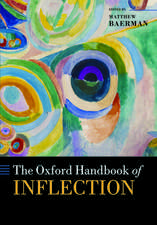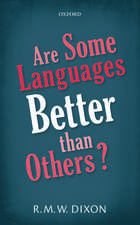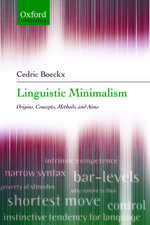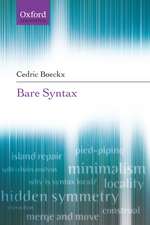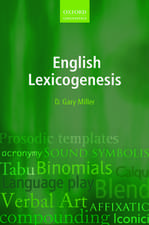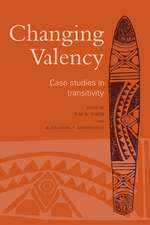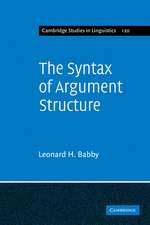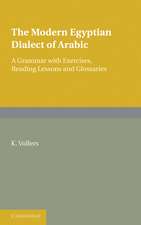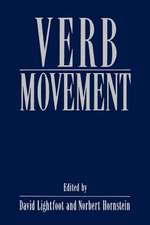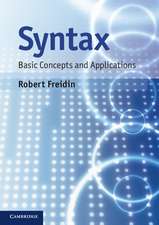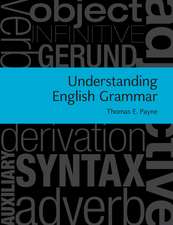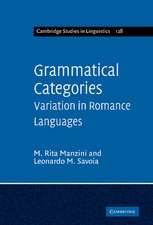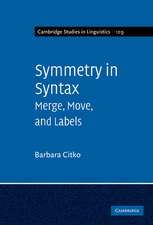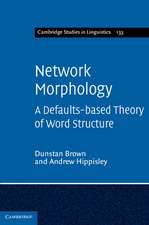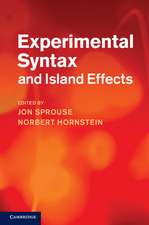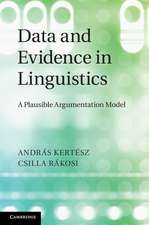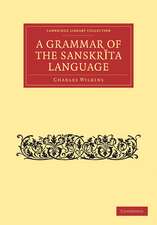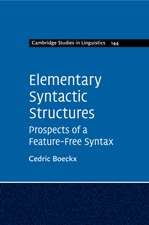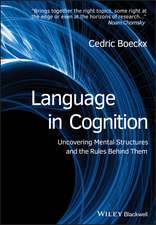Control as Movement: Cambridge Studies in Linguistics, cartea 126
Autor Cedric Boeckx, Norbert Hornstein, Jairo Nunesen Limba Engleză Paperback – 16 apr 2014
| Toate formatele și edițiile | Preț | Express |
|---|---|---|
| Paperback (1) | 328.08 lei 6-8 săpt. | |
| Cambridge University Press – 16 apr 2014 | 328.08 lei 6-8 săpt. | |
| Hardback (1) | 726.42 lei 6-8 săpt. | |
| Cambridge University Press – 25 aug 2010 | 726.42 lei 6-8 săpt. |
Din seria Cambridge Studies in Linguistics
-
 Preț: 178.20 lei
Preț: 178.20 lei -
 Preț: 239.36 lei
Preț: 239.36 lei -
 Preț: 176.27 lei
Preț: 176.27 lei -
 Preț: 236.78 lei
Preț: 236.78 lei - 9%
 Preț: 730.86 lei
Preț: 730.86 lei -
 Preț: 290.09 lei
Preț: 290.09 lei -
 Preț: 236.58 lei
Preț: 236.58 lei -
 Preț: 236.05 lei
Preț: 236.05 lei -
 Preț: 328.65 lei
Preț: 328.65 lei -
 Preț: 403.66 lei
Preț: 403.66 lei -
 Preț: 283.79 lei
Preț: 283.79 lei -
 Preț: 325.16 lei
Preț: 325.16 lei -
 Preț: 281.30 lei
Preț: 281.30 lei -
 Preț: 285.93 lei
Preț: 285.93 lei -
 Preț: 282.48 lei
Preț: 282.48 lei -
 Preț: 285.16 lei
Preț: 285.16 lei -
 Preț: 343.43 lei
Preț: 343.43 lei -
 Preț: 319.74 lei
Preț: 319.74 lei -
 Preț: 283.63 lei
Preț: 283.63 lei -
 Preț: 287.48 lei
Preț: 287.48 lei -
 Preț: 391.62 lei
Preț: 391.62 lei -
 Preț: 327.03 lei
Preț: 327.03 lei -
 Preț: 282.10 lei
Preț: 282.10 lei -
 Preț: 285.75 lei
Preț: 285.75 lei -
 Preț: 219.81 lei
Preț: 219.81 lei - 11%
 Preț: 509.10 lei
Preț: 509.10 lei -
 Preț: 220.57 lei
Preț: 220.57 lei -
 Preț: 455.74 lei
Preț: 455.74 lei -
 Preț: 247.08 lei
Preț: 247.08 lei -
 Preț: 222.19 lei
Preț: 222.19 lei -
 Preț: 324.40 lei
Preț: 324.40 lei -
 Preț: 322.29 lei
Preț: 322.29 lei -
 Preț: 399.59 lei
Preț: 399.59 lei -
 Preț: 326.15 lei
Preț: 326.15 lei - 11%
 Preț: 451.14 lei
Preț: 451.14 lei -
 Preț: 415.02 lei
Preț: 415.02 lei - 14%
 Preț: 724.58 lei
Preț: 724.58 lei
Preț: 328.08 lei
Nou
Puncte Express: 492
Preț estimativ în valută:
62.78€ • 65.54$ • 51.96£
62.78€ • 65.54$ • 51.96£
Carte tipărită la comandă
Livrare economică 04-18 aprilie
Preluare comenzi: 021 569.72.76
Specificații
ISBN-13: 9781107672062
ISBN-10: 1107672066
Pagini: 274
Dimensiuni: 152 x 229 x 15 mm
Greutate: 0.37 kg
Editura: Cambridge University Press
Colecția Cambridge University Press
Seria Cambridge Studies in Linguistics
Locul publicării:New York, United States
ISBN-10: 1107672066
Pagini: 274
Dimensiuni: 152 x 229 x 15 mm
Greutate: 0.37 kg
Editura: Cambridge University Press
Colecția Cambridge University Press
Seria Cambridge Studies in Linguistics
Locul publicării:New York, United States
Cuprins
1. Introduction; 2. Some historical background; 3. Basic properties of the Movement Theory of Control; 4. Empirical advantages; 5. Empirical challenges and solutions; 6. On non-obligatory control; 7. Some notes on semantic approaches to control; 8. The movement theory of control and the minimalist program.
Notă biografică
Descriere
Presents the main arguments for and against the Movement Theory of Control.
